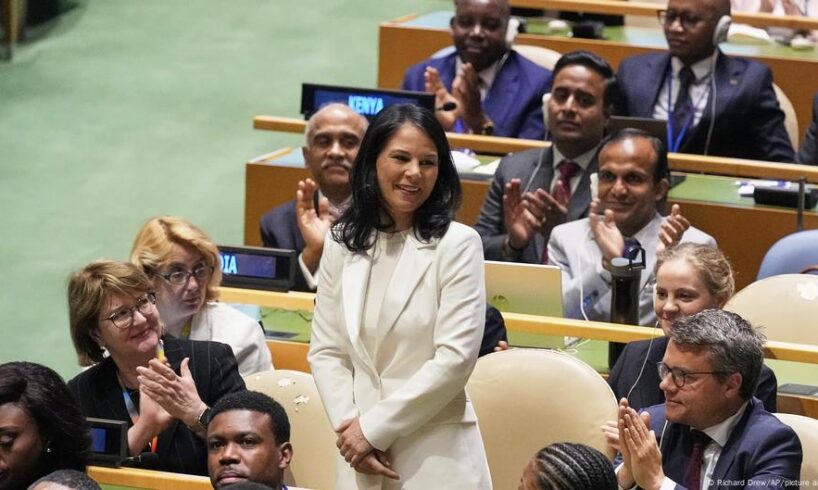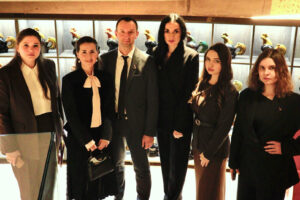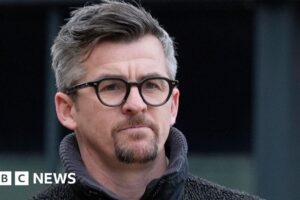
Although she lost her post in the German government this year, Annalena Baerbock, the former German foreign minister, will continue to play a prominent role on the world stage.
Until May, when Friedrich Merz of the center-right Christian Democratic Union (CDU) was elected as the new German chancellor, the 44-year-old Green Party politician was still Germany’s top diplomat. Then, on June 2, she was elected as the new president of the United Nations (UN) General Assembly in New York.
However, unlike her predecessors, Baerbock was not approved by the customary show of hands to signal unanimous approval, but through a secret ballot. According to diplomats, this procedure had been requested by Russia and was interpreted as a small act of malice, because as foreign minister, Baerbock had always openly criticized Russia’s war of aggression against Ukraine.
In the end, she received 167 of 193 possible votes at the UN’s headquarters in New York. Now she will take up her post after having left her seat in the Bundestag.
UN must be updated to meet 21st-century demands: Baerbock
To view this video please enable JavaScript, and consider upgrading to a web browser that supports HTML5 video
A position without much publicity
The former Green Party co-leader and chancellor candidate will chair and manage meetings at the UN for the next year. It’s a job that doesn’t come with much public exposure. Baerbock will hold a lot of closed-door talks on issues to be discussed in the assembly.
In collaboration with the UN ambassadors of the 193 member states, Baerbock will also help prepare for the election of a new UN Secretary-General next year. The current Secretary-General, António Guterres, will remain in office until the end of 2026.
Criticism from Chancellor Merz
However, as she begins her new role in New York, the Green Party politician has not received congratulations from all the politicians in her home country. At a party conference of the conservative Christian Democratic Union (CDU) in North Rhine-Westphalia, Chancellor Friedrich Merz said that there will be no “agonizing discussions” in his new government, like those held in recent years “about whatever sort of foreign policy this lady, who is now in New York, might pursue.”
Baerbock has indeed often enjoyed taking polarizing stances, not only toward Russia but also toward China.
A member of the former center-left government coalition of Social Democratic Party (SPD), the Greens, and the Free Democratic Party (FDP), who preferred to remain anonymous, told DW that it had always been strange that “the least diplomatic person I know” had become foreign minister.
Germany’s Baerbock elected president of UN General Assembly
To view this video please enable JavaScript, and consider upgrading to a web browser that supports HTML5 video
And Baerbock’s nomination for the UN post was not without friction. In March, it became known that the old minority government under Chancellor Olaf Scholz had proposed Baerbock for the job in New York. It had been known for some time that the post was reserved for one of the Western European countries and that Germany was allowed to nominate a candidate.
At the end of March, then government spokesman Steffen Hebestreit said that Baerbock was “highly qualified for the job.” Apparently, the appointment had also been cleared with the future government, in other words, with Merz.
But Germany had originally intended to nominate the highly respected diplomat Helga Schmid to the position in New York. Schmid, born in 1960, has had an exemplary career at the German Foreign Ministry. She was chief-of-staff for another Green Party foreign minister, Joschka Fischer, in office from 1998 to 2005. Later, she was one of the main authors of the nuclear agreement between the EU and other countries with Iran, which was successfully concluded in 2015 but later terminated by US President Donald Trump during his first term in office.
‘Nobody can blackmail us’
To view this video please enable JavaScript, and consider upgrading to a web browser that supports HTML5 video
Baerbock now wants to be a unifying force
But then the government changed its mind and nominated Baerbock instead. After her nomination in March, Baerbock said: “As president, if elected, I will serve all 193 Member States — large and small. As an honest broker. As a unifier. With an open ear. And an open door.”
A little later, during her last trip abroad as foreign minister, she said on the Danish island of Bornholm: “We are in a situation in which we are more aware than ever before of the importance of our constitution, the Basic Law, the European peace order, and the Charter of the United Nations.” The United Nations has been in existence for 80 years, she said, and its values must be defended and upheld every day.
Baerbock’s sudden nomination immediately provoked irritation. Criticism was directed at the fact that the outgoing minority government, then only acting in a managing capacity, had rushed through the appointment. In an interview with Berlin’s Tagesspiegel newspaper, Christoph Heusgen, former chairman of the Munich Security Conference (MSC), said it was “an outrage to replace Germany’s best and most internationally experienced diplomat with an out-of-date product.” As secretary general of the Organization for Security and Co-operation in Europe (OSCE), Helga Schmid “protected the organization from falling apart,” said Heusgen, who served as foreign and security policy advisor to Chancellor Angela Merkel (CDU) for several years.
Later during her visit to Bornholm, Baerbock described her experience serving as foreign minister from December 2021 to May 2025 as an asset. “As foreign minister, I traveled extensively around the world, including to regions that are somewhat further away, such as the Middle East. When I took office, I could not have imagined that I would visit some Gulf states and Arab countries more often than our European EU partners due to the challenging situation in the Middle East. This also creates even stronger ties with these countries.”
Now, Baerbock’s start at the UN comes at a time when the former Vice Chancellor and Economy MinisterRobert Habeck has also retired from German politics. Having resigned from his seat in the Bundestag, he will now teach at the Copenhagen Institute for International Studies, among other places.
For many years, Baerbock and Habeck were the two leading figures in the Green Party, which now has to reinvent itself as an opposition party.
This article was originally written in German.
While you’re here: Every Tuesday, DW editors round up what is happening in German politics and society. You can sign up here for the weekly email newsletter, Berlin Briefing.





